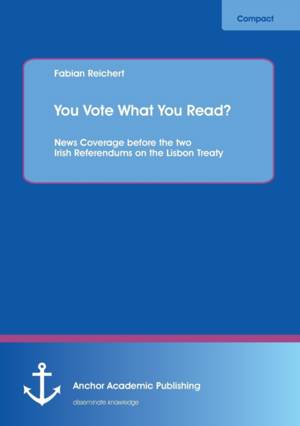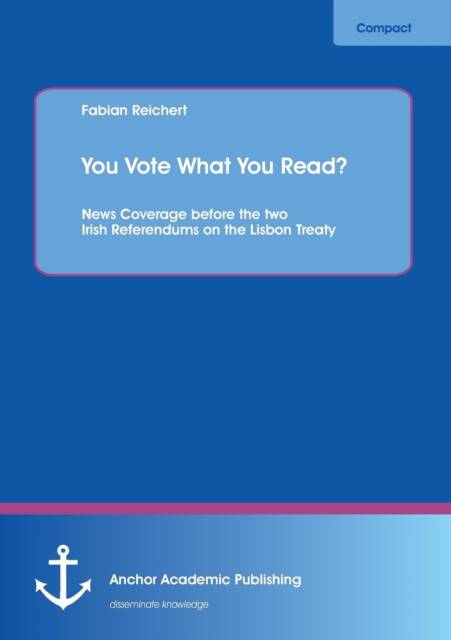
- Afhalen na 1 uur in een winkel met voorraad
- Gratis thuislevering in België vanaf € 30
- Ruim aanbod met 7 miljoen producten
- Afhalen na 1 uur in een winkel met voorraad
- Gratis thuislevering in België vanaf € 30
- Ruim aanbod met 7 miljoen producten
Zoeken
You Vote What You Read? News Coverage before the two Irish Referendums on the Lisbon Treaty
Fabian Reichert
€ 34,45
+ 68 punten
Omschrijving
Eurobarometer shared recently that 41% of the EU citizens get their main information on European topics from daily newspapers. This is also the case for those citizens who decided on the adaption of the Lisbon treaty in the two nationwide referendums, in Ireland. But, as many media researchers showed, news coverage is biased. However, it has to be biased for it is simply not possible to report the entire reality in one article. One aspect of news bias is known under the term framing. Framing leads readers to think in a certain direction for journalists underline certain aspects in a news story, and usually, cover a story only from one angle. Therefore, the journalist's angle can have a high influence on the reader's opinion. The study follows these hints and examines the news coverage before the two Irish referendums on the Lisbon treaty took place. Applying a content and framing analysis of the two most selling Irish newspapers, namely 'the Irish Times' and 'the Irish Independent', it aims to make statements about the framing of the treaty in the news, and gives evidence to the informative value of the title.
Specificaties
Betrokkenen
- Auteur(s):
- Uitgeverij:
Inhoud
- Aantal bladzijden:
- 48
- Taal:
- Engels
- Reeks:
Eigenschappen
- Productcode (EAN):
- 9783954890552
- Verschijningsdatum:
- 16/05/2013
- Uitvoering:
- Paperback
- Formaat:
- Trade paperback (VS)
- Afmetingen:
- 148 mm x 210 mm
- Gewicht:
- 72 g

Alleen bij Standaard Boekhandel
+ 68 punten op je klantenkaart van Standaard Boekhandel
Beoordelingen
We publiceren alleen reviews die voldoen aan de voorwaarden voor reviews. Bekijk onze voorwaarden voor reviews.











